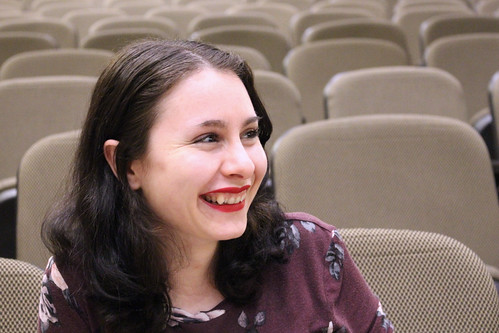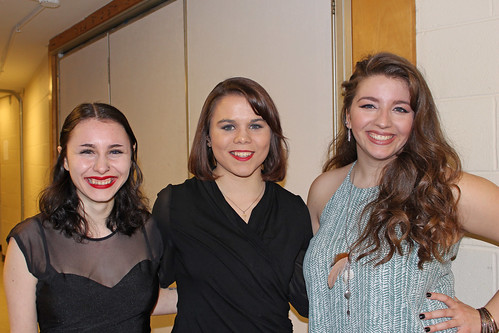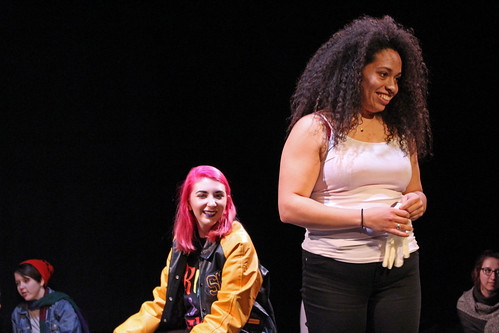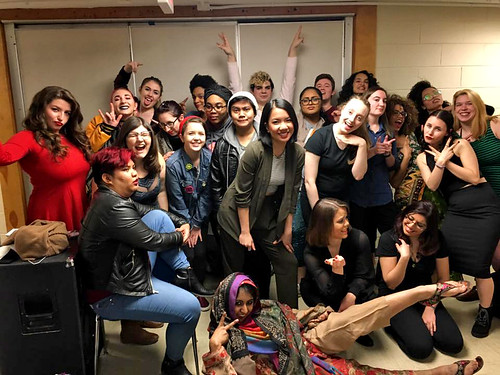
The tradition of producing Eve Ensler feminist theatre during the spring semester is passed down informally through the classes…this year, two students, Elly Weinstock and Gianna Ensminger, spent a year producing The Good Body and explored body image in cultures around the world.
It was during her first year at Hofstra that Elly Weinstock had an awakening. “I started out by being in the Vagina Monologues my freshman year – I’m not sure if I considered myself a feminist before that, but I was in the show and I fell in love with having that community of women and fell in love with the idea of being able to create that with other women.”
Now a seasoned campus activist, an intern for PEN America in New York, an RA and a graduating senior in public relations, Weinstock is preparing for life outside the University’s walls. But she took the time during a demanding senior year to co-direct and produce Eve Ensler’s The Good Body, continuing an informal, passed-down tradition at Hofstra of producing an Eve Ensler show in February or March each year.
“Producing a play is like having a job or a whole class - it’s a lot of work, meetings. You have to reserve the entire weekend every weekend for months, for rehearsals, putting flyers together, making tickets, materials,” said Weinstock. “But the most rewarding thing is creating a sense of community. I got to know a lot of people on campus, from different years, different majors, and create a more positive message about feminism. Amazing friendships started from being in the shows, and it’s super rewarding to see people make friends - and then to have feminism or human rights or whatever it sparks in them blossom.”
This is, then, a labor of love – not for credit or grades or a resume – but an act of advocacy and commitment. What the cast members have had in common over the years is not only a love of story and performance but also of sharing difficult stories about gender, race, sexuality – and the forms of violence and discrimination that come from those places – in the name of empowerment.
For Weinstock’s partner and co-director, senior History/Women and Gender Studies student Gianna Ensminger, producing The Good Body was a natural next step after the other Eve Ensler shows, “The Good Body focuses on body image across-cultures - one subject and how it affects all these different women. And it is a complicated issue – it’s not this battle between large women and small women – so much more, so much gray area that intersects with sexuality, race, with whether you are able bodied or not, these shows get people thinking about these issues.”
Through a series of monologues and conversations with “Eve,” who is traveling the world while dealing with her own body image issues, a number of difficult issues are raised.
Kali McCauley, a junior chemistry major, plays a model, Tiffany, who is married to her plastic surgeon. “She deals a lot with what it’s like to be in a relationship where her entire body image is based off her surgeon who is also her partner, and she has devolved in a sense, that she has no concept of who she is anymore except for who he says she should be. There are things in this show everyone can relate to – how we think of beauty and our bodies.”
Another role was senior computer science major Siobhan Stergis’ Dana, a twenty-something lesbian, who “wants to wake up Eve’s stomach, Eve’s sense of torment, through piercings. Dana’s piercings are her way of expressing her identity and her sexuality. I loved the part of the monologue where she addresses the rules of being a lesbian. I think it’s cool how she empowers herself in a way to express how she is gay, her gayness, as opposed to taking on too much of an informed view of her sexuality.”
But it is through Eve that we learn stories about body image from around the world and how pervasive it is. According to Niki Rihal, senior music and public relations major, “The Good Body’s themes pertain to all sorts of things – sexual needs, abuse issues, things I didn’t think of – I like the fact that it points all those things out and brings a conversation home. I’ve struggled with self-esteem issues and body issues my entire life.”
Eve’s journey is such an integral part of the show that the directors split the part into four different Eves – guaranteeing that in fact, Eve could be seen as an everywoman. According to Rihal, who was one of the four Eves, “Eve is very personal in some parts for me – she hates her body, she gets really frustrated, she works at the gym, works at it all the time, but then she goes back into the binge eating cycles of ‘I just want to eat everything’ and it’s that back-and-forth cycle and I really relate to that.”
It is story, then, that provides the audience with the many facets of body image. From Bernice, an African-American teenager at a fat camp, to Nina, a formerly voluptuous Italian woman dealing with incest, to Priya, an Indian woman coming to terms with her body, the people of The Good Body tell us stories in their authentic voices – funny, sad, truthful, outrageous and difficult.
According to Ensminger, “these shows, because they are presented artistically, ease people in… so we can have an honest discussion about what is happening to people around the world.”
Along the way, another group of students, that intersect gender and race, academic interest and age, grow close with a newfound commitment to equality for all. Stergis summed it up, “This has been amazing –all these people are on the same wavelength – sympathizing, unpacking each of these characters, and how we related to different stories and each other’s stories, sharing in this celebration in that our bodies are fine the way they are – we just need to live in them and we’re good, just for being here. It’s been a beautiful revelation.”



